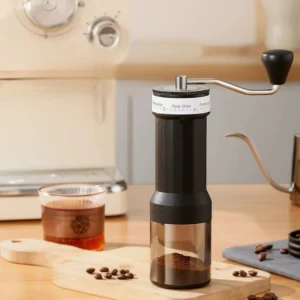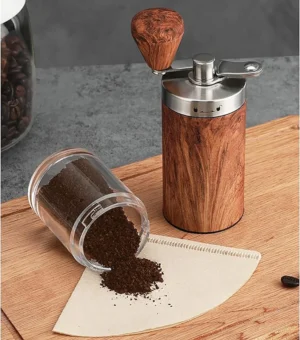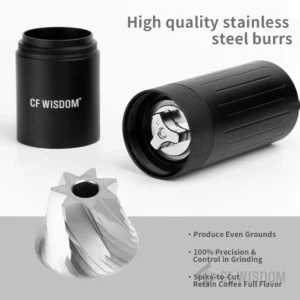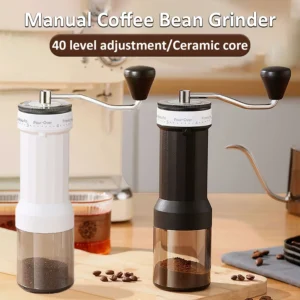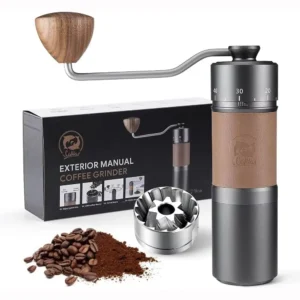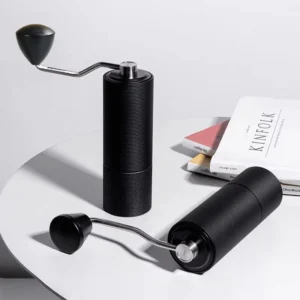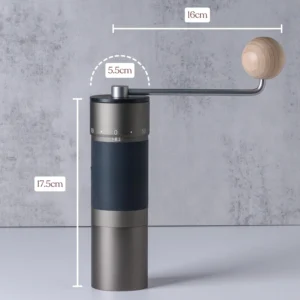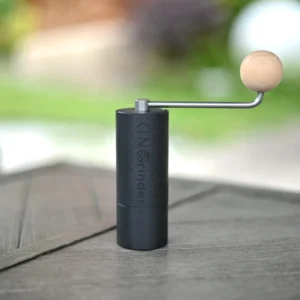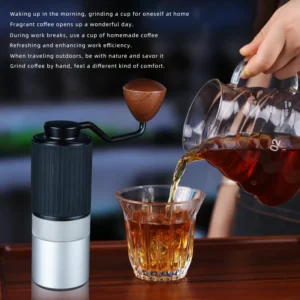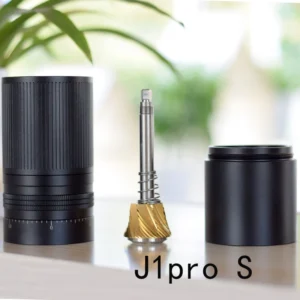Hand Crank Coffee Grinder
Unlock rich coffee flavor with freshly ground beans. These quiet, portable hand crank grinders offer precise control for your perfect brew, at home or on adventures.
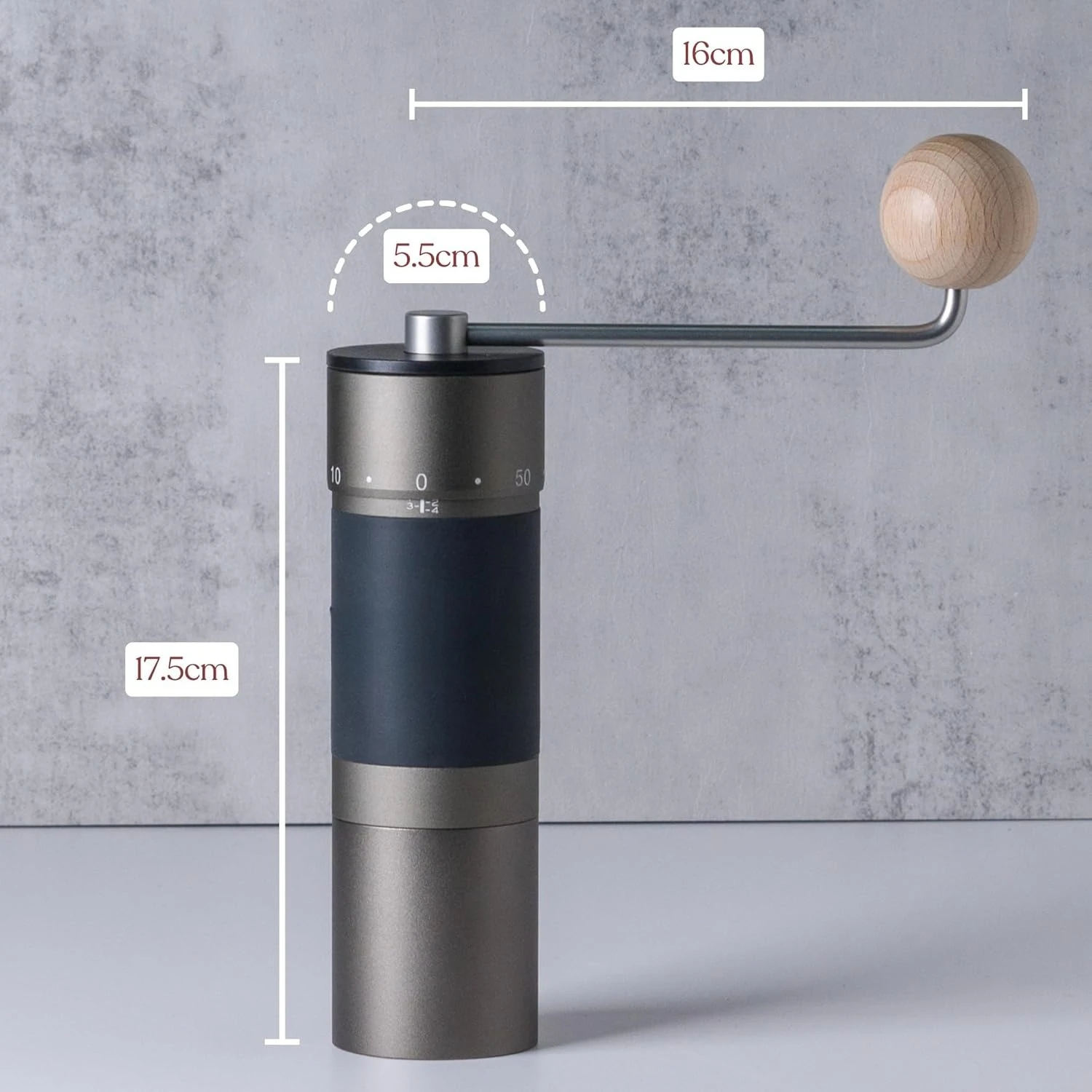
Showing 1–12 of 31 results
Ceramic Burr Coffee Grinder, Hand Crank Coffee Grinder, Handheld Coffee Grinder, Manual Coffee Bean Grinder
Price range: $99.47 through $99.72 Select options This product has multiple variants. The options may be chosen on the product pageHand Burr Grinder, Hand Crank Coffee Grinder, Handheld Coffee Grinder, Manual Coffee Grinder Stainless Steel
$469.47 Select options This product has multiple variants. The options may be chosen on the product pageHand Crank Coffee Grinder, Manual Coffee Bean Grinder, Manual Coffee Grinder for Espresso, Manual Coffee Mill Grinder
$63.31 Select options This product has multiple variants. The options may be chosen on the product pageHand Burr Grinder, Hand Crank Coffee Grinder, Handheld Coffee Grinder, Travel Coffee Grinder
$240.28 Select options This product has multiple variants. The options may be chosen on the product pageHand Burr Grinder, Hand Crank Coffee Grinder, Handheld Coffee Grinder, Travel Coffee Grinder
Price range: $161.10 through $175.32 Select options This product has multiple variants. The options may be chosen on the product pageCeramic Burr Coffee Grinder, Hand Burr Grinder, Hand Crank Coffee Grinder, Manual Coffee Bean Grinder
Price range: $59.17 through $59.96 Select options This product has multiple variants. The options may be chosen on the product pageHand Crank Coffee Grinder, Manual Burr Mill, Manual Coffee Bean Grinder
Price range: $2,053.84 through $2,918.42 Select options This product has multiple variants. The options may be chosen on the product pageHand Burr Grinder, Hand Crank Coffee Grinder, Manual Coffee Bean Grinder, Manual Coffee Grinder Stainless Steel
$314.26 Select options This product has multiple variants. The options may be chosen on the product pageHand Crank Coffee Grinder, Manual Coffee Bean Grinder, Manual Coffee Grinder Stainless Steel, Travel Coffee Grinder
$169.60 Select options This product has multiple variants. The options may be chosen on the product pageHand Crank Coffee Grinder, Manual Coffee Grinder for Espresso, Manual Coffee Grinder Stainless Steel
$349.15 Select options This product has multiple variants. The options may be chosen on the product pageHand Burr Grinder, Hand Crank Coffee Grinder, Handheld Coffee Grinder, Manual Coffee Grinder Stainless Steel
Price range: $184.43 through $202.81 Select options This product has multiple variants. The options may be chosen on the product page
Showing 1–12 of 31 results
Understanding Hand Crank Coffee Grinders
Hand crank coffee grinders are manual devices designed to grind whole coffee beans into grounds without electricity. At their core, these grinders utilize burr mechanisms—two abrasive surfaces that crush beans between them with precision and consistency. Unlike electric grinders that can heat beans during grinding (potentially affecting flavor) or blade grinders that chop beans unevenly, hand grinders offer meticulous control over the grinding process.
The fundamental components include a hopper where beans are loaded, the grinding burrs, an adjustment mechanism to control grind size, a crank handle that provides the turning power, and a collection chamber for the grounds. When you turn the handle, you directly rotate the burrs, crushing beans between them as they fall through and into the collection area.
This simple yet effective design forms the foundation of what makes hand crank coffee grinders special. The direct connection between your effort and the grinding process establishes the first step toward coffee perfection—properly ground beans that release optimal flavor during brewing.
Why Choose a Manual Coffee Grinder?
Opting for a manual coffee grinder represents a deliberate choice for coffee enthusiasts who understand that exceptional coffee begins with properly ground beans. The benefits extend far beyond simple grinding functionality.
Fresh grinding immediately before brewing ensures maximum flavor preservation—coffee begins losing aromatic compounds within minutes of grinding. Unlike electric counterparts, manual grinders provide remarkable grind consistency without generating heat that can alter delicate coffee flavors.
The compact size and independence from electrical outlets make manual grinders ideal companions for travel, camping, or office use. Their whisper-quiet operation means you can prepare morning coffee without disturbing sleeping household members—something impossible with noisy electric models.
Manual grinders also offer exceptional durability through mechanical simplicity. With fewer components that could fail and no motors to burn out, a quality manual grinder can last decades with proper care. Perhaps most compelling is their value proposition—the same burr quality found in expensive electric models often costs significantly less in manual form.
Finally, there’s the tangible satisfaction of the grinding ritual itself. The physical connection to the coffee preparation process creates a moment of mindfulness before brewing—a brief pause that coffee enthusiasts often find as rewarding as the resulting cup.
Key Features to Consider
When selecting a hand grinder, understanding key features ensures you find the perfect match for your brewing needs:
Burr Materials:
– Ceramic burrs resist heat buildup and maintain sharpness for years, though they can be brittle
– Stainless steel burrs offer exceptional precision for fine grinds and greater durability against small stones or debris
Adjustment Mechanism:
– Stepped systems provide distinct “clicks” between settings for repeatable results
– Stepless systems offer infinite adjustment points ideal for precise micro-adjustments needed for espresso
Construction Materials:
– Stainless steel bodies provide durability and stability during grinding
– Aluminum offers lightweight strength, particularly valuable for travel
– Wood provides aesthetic appeal and natural grip
– High-quality plastics reduce weight and cost
Capacity Considerations:
– Smaller hoppers (15-30g) suit single cups but require refilling for multiple servings
– Larger hoppers (30-50g) accommodate enough beans for several cups
Ergonomics:
– Handle length affects torque and ease of grinding
– Grip materials impact comfort during extended grinding sessions
– Base stability prevents tipping during use
The ideal combination of these features depends largely on your primary brewing method and where you’ll use your grinder most frequently.
Matching Your Grinder to Brewing Methods
Different coffee preparation techniques require specific grind profiles for optimal extraction:
| Brewing Method | Ideal Grind Size | Key Grinder Features |
|---|---|---|
| Espresso | Very fine | Precise adjustments, stable burrs |
| Pour-over | Medium-fine | Consistency at medium settings |
| Drip | Medium | Good particle uniformity |
| AeroPress | Fine to medium | Versatile adjustment range |
| French Press | Coarse | Consistent coarse grinding |
| Cold Brew | Very coarse | Uniform large particles |
For espresso enthusiasts, a manual espresso grinder with fine adjustment capabilities and robust burrs is essential for achieving the precise resistance needed for proper extraction. Pour-over methods benefit from grinders that produce uniform medium-fine particles for even extraction, while French press brewers should prioritize consistency at coarser settings to minimize silt.
The versatility to handle multiple brewing methods makes hand grinders particularly valuable for coffee explorers who enjoy various preparation techniques.
Care and Maintenance for Longevity
With proper maintenance, a quality hand grinder can provide decades of service. Regular cleaning prevents oil buildup that can turn rancid and affect flavor.
For routine maintenance, simply brush loose grounds from burrs and internal surfaces after each use. Every few weeks, depending on usage, perform a deeper cleaning by disassembling washable components and using a dry brush for hard-to-reach areas. Avoid submerging non-washable parts or using water on burrs unless specified by the manufacturer.
Watch for warning signs that indicate maintenance needs:
– Increased grinding difficulty or resistance
– Inconsistent grind sizes
– Unusual noises during operation
– Visible burr wear or damage
For storage, keep your grinder in a dry environment and consider running a few beans through before extended storage periods to clear oils from burrs.
At Savor Suite, we recommend checking burr alignment annually for optimal performance—a simple procedure that ensures continued grinding precision.
FAQ: Common Questions About Hand Coffee Grinders
How long does manual grinding take?
Typically 1-2 minutes for a single cup (15-20g of beans), depending on grind size and burr design. Finer grinds require more time and effort than coarser settings.
Can hand grinders produce consistent espresso grinds?
Yes, quality manual grinders with precision adjustment mechanisms can achieve the fine, consistent grind needed for espresso. Look for models specifically designed for espresso with features like dual bearings for stability.
Are ceramic or steel burrs better?
Both perform excellently with different strengths. Ceramic excels in heat resistance and longevity but can be more fragile. Steel offers exceptional precision for fine grinds and greater durability against foreign objects.
How often should I replace burrs?
Quality burrs can last 5-10+ years with proper care. Ceramic burrs generally outlast steel for home use, though steel maintains edge precision longer when grinding daily.
Do manual grinders match electric grinders in consistency?
High-quality manual grinders often match or exceed the consistency of electric grinders in the same price range. The difference becomes most noticeable only when comparing to premium electric models costing several times more.

